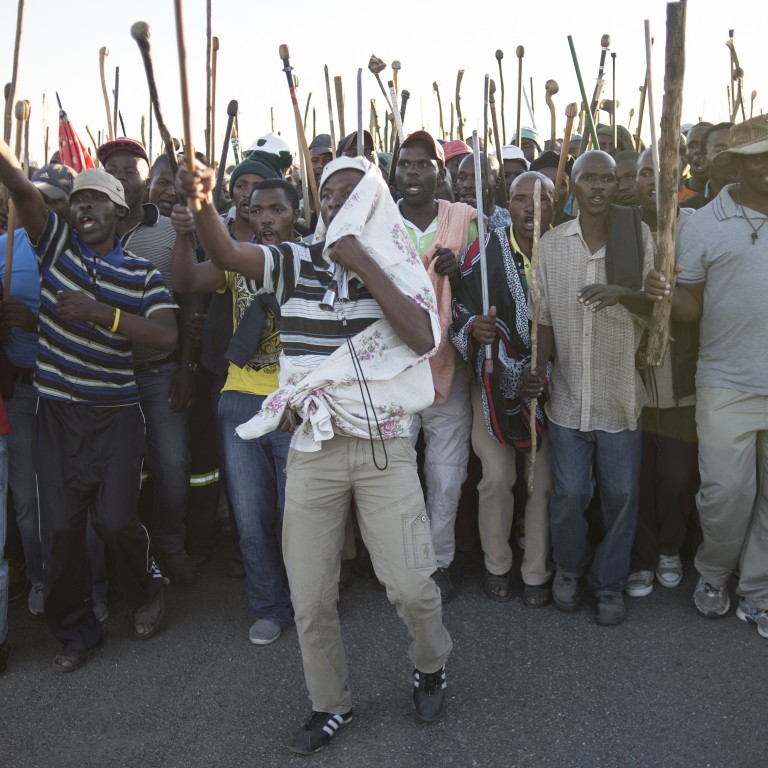
Mining giant Lonmin slammed for workers’ ‘appalling’ housing
Company's failure to address housing conditions following fatal 2012 strikes is 'baffling and irresponsible in the extreme,' according to Amnesty
Workers at Lonmin mines in South Africa still live in the "truly appalling" conditions that were a major factor behind the fatal strikes four years ago, human rights organisation Amnesty International said on Monday.
Lonmin is one of the world's biggest platinum producers and its stock is listed on the UK's FTSE 250 index. Thirty-four miners at its main Marikana mine in South Africa were killed by the national police in August 2012 after violent strikes over pay. The shootings provoked national outrage and a government inquiry that found that squalid living conditions had contributed to the strike.
In a report on Monday, Amnesty International said many of the approximately 20,000 miners still lived in bleak informal settlements, despite a legally binding commitment from Lonmin to build more houses.
"The catastrophic events of August 2012 should have been a decisive wake-up call to Lonmin that it must address these truly appalling living conditions. The company's failure to improve employees' housing is baffling and irresponsible in the extreme. Lonmin is aware that dire housing contributed to the unrest four years ago that ultimately led to the death of dozens of miners," said Deprose Muchena, Amnesty International's director for Southern Africa.
Lonmin has failed to meet its commitment to provide 5,500 houses for workers, Amnesty said. It called for the South African Ministry of Mineral Resources to investigate and consider sanctioning the company.
"Lonmin is not the only mining company in South Africa that is failing its workforce on adequate housing. But it is unique in that what can only be described as a shattering wake-up call has been ignored," Amnesty's report said.
It cited a Lonmin worker describing his living conditions:
"We have many instances where we run out of water, we have many instances where we have no electricity and this can go on for days where we are without water or electricity. That is not normal at all. Even the back houses (toilets) we use are terrible, there are always flies about that get into your shack," the unnamed miner said.
In a letter responding to Amnesty's accusations, Lonmin admitted that around 13,500 miners — many of whom are migrants from South Africa's poorer neighboring countries — still had no formal accommodation.
The company said it had allocated 100 million rand (US$7.4 million) each year for housing since 2012 — but added this might be "reconsidered" given "current economic constraints." It said it was encouraging employees to purchase stand-alone houses and had renovated all of its 2,684 workers' hostels.
Amnesty accused the company of misleading shareholders about the situation.
"Lonmin has repeatedly made false and misleading statements to shareholders and stakeholders in its reporting on the housing situation at Marikana," the report said.
"Shareholders and stakeholders were told that employees wanted to buy houses when they did not; that financial agreement was in place that was never concluded; that more than 1,000 houses were built when the houses in question date back to the 1990s; and that the company lacked serviced land."
The mining giant has slashed jobs at the mine in an attempt to break even, following a 50 per cent collapse in mining prices between 2011 and 2015. It cut 19 per cent of its workforce in the 12 months to June 2016, including 6,861 employees at its Marikana and Pandora mines. Platinum prices have risen by around 30 per cent since the start of 2016, but remain low in historical terms.
In its second-quarter earnings, Lonmin reported a 3.3 per cent rise in platinum production on the year, but warned that wage negotiations and public holidays could impact production and costs during the rest of the year. It also said three workers had been fatally injured working at Marikana between April and July this year.

